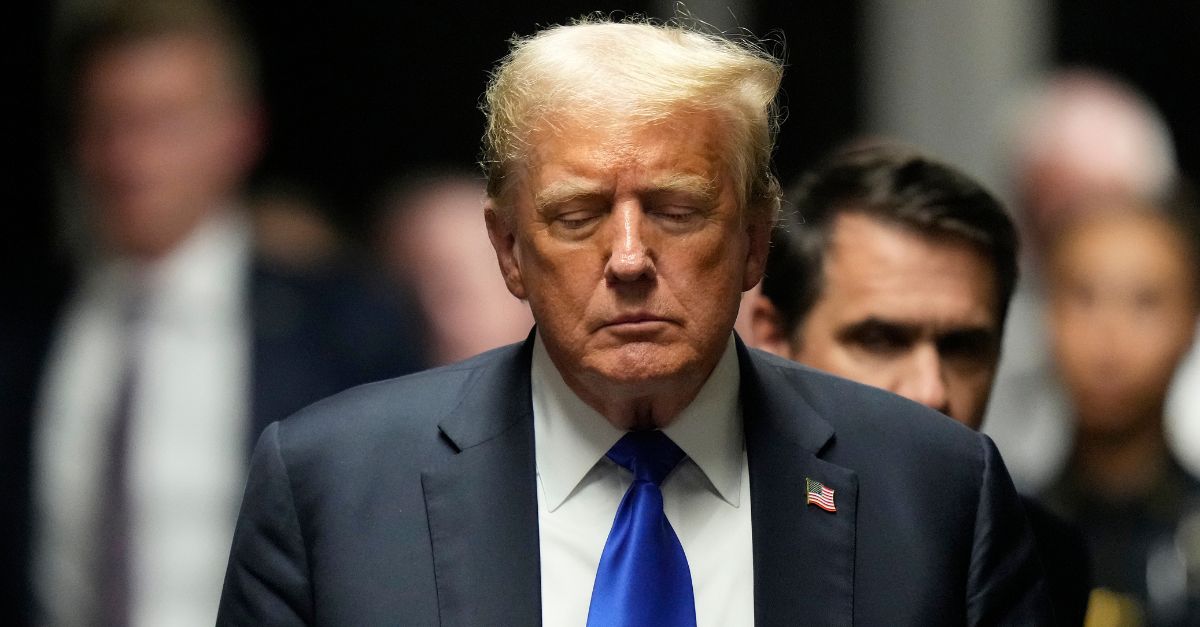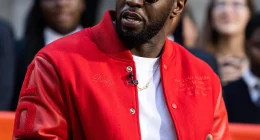
Former President Donald Trump walks to make comments to members of the media after a jury convicted him of felony crimes for falsifying business records in a scheme to illegally influence the 2016 election, at Manhattan Criminal Court, Thursday, May 30, 2024, in New York. (AP Photo/Seth Wenig, Pool)
It’s official: Donald Trump is the first American president to become a convicted felon. On May 30, 2024, a New York City jury of five women and seven men found Trump guilty on thirty-four counts of falsifying business records (to cover up a hush money payment to adult film star Stormy Daniels) in the first degree.
The question now is: will this reality skew voter perception and their actions come November? Sentencing is set to take place in July. Until then, it will remain to be seen whether or not Trump will be eligible to vote for himself on this year’s presidential ballot.
Trump’s latest trial appears to blur the line between reality and reality TV drama, both of which he is familiar with. Though the charges are very much real, the cast of characters and salacious details have been part of mainstream media for several seasons now.
There are plot twists and character arcs, surprise reveals, and rehashed stories from years past. Unfortunately, for Americans, this isn’t a guilty pleasure production they can switch off and forget about tomorrow as the main character is a presidential candidate.
The hush money trial involves Trump’s attempt to cover up the story of his alleged affair with adult film star Stormy Daniels. So far, it’s included Daniels’ testimony regarding detailed sexual encounters, followed by testimony from Michael Cohen, the former president’s ex-lawyer.
Though Trump’s current defense lawyer plans a cross-examination to spotlight Cohen as a convicted felon and perjurer seeking vengeance, it’ll be up to the jury to decide credibility on both sides. They have to look at the facts and evidence of the case presented while removing bias about the behavior on display.
Trump faced 34 counts of falsifying business records to hide the reimbursement to Cohen for the payment made to Daniels ahead of the 2016 presidential election, all of which Trump has denied guilt.
Michael Cohen: Friend or foe?
Cohen surrendered to prison five years ago, serving 13 months of a three-year sentence in a New York federal correctional facility, and now is serving the remainder of his sentence in home confinement. He pleaded guilty to several federal crimes in 2018, including tax fraud about plans to build a Trump Tower in Moscow.
Paul Manafort, a former Trump campaign aide, was also convicted on charges related to tax evasion and sentenced to prison. However, during the final days of Trump’s administration, he pardoned Manafort.
On Tuesday, May 14, Cohen continued his testimony and stated he didn’t regret working for the Trump Organization but did regret “doing things for him that I should not have.” The day prior, he testified in front of the jury details about how Trump ordered him to pay Stormy Daniels $130,000 in October 2016, a month ahead of the presidential election.
Before Cohen took the stand, Justice Juan Merchan instructed prosecutors to ask Cohen to refrain from talking publicly about the case, a reference to Cohen frequently taking to TikTok to comment. As the trial continues into its fifth week, it’ll be interesting to see who else is called to stand, and whether that person is an ally or another friend-turned-foe of Donald Trump.
Next up: The classified documents case?
Many of the main players have demonstrated problematic behavior, though the job of the jury isn’t to decide who is causing the most trouble. The jury must rely on testimony and facts to decide if the charges brought upon Trump in this specific case hold up to be true.
However, even if Trump is convicted of the charges, prison time seems unlikely.
Falsifying business records on a felony level carries a sentence of up to four years in prison. Yet, first-time offenders of non-violent crimes often receive probation. This potentially means Trump could be serving probation for a conviction on felony charges in this case while standing trial for his next one.
Trump’s classified documents case was originally scheduled to proceed on May 20. However, as of May 7, U.S. District Judge Aileen Cannon, who is presiding over Trump’s Florida criminal case, has indefinitely postponed the trial.
Her reasoning is to resolve the backlog of pre-trial issues before moving forward, though some legal experts have called for the recusal of the Florida judge, as she was a Trump appointee in late 2020.
A presidential hopeful otherwise engaged
It remains to be seen whether Trump will stand trial in any of his three other criminal cases in 2024 or his legal consequences will continue well after this year’s presidential election. Delay has been part of the strategy from the beginning.
But because of this, it’s impossible to remove politics from the legal conversation, as the person standing trial is a former president and hopes to regain office once again.
Lingering questions leading up to the election are what would the country expect if he wins the presidential race? Would he pardon himself? Moreover, would his focus be on the country’s best interests or would he be distracted by his own ongoing legal woes?
It appears to be a conflict of interest at the least, though Trump supporters argue the opposite, as they double down on their loyalty and see how things play out.
Meanwhile, as the public watches the remaining trials play out in real time, it’s tough to switch direction and focus on what’s looming ahead in six months. Some voters follow the trials closely and others have become exhausted by the drama and repeated details of it all.
But sans TV, the reality is, come November, Americans will be asked to vote for their next president. Political differences aside, does it make sense to choose one who, for a good part of his term, will be otherwise engaged, standing trial yet again in a court of law?
Kelly Hyman is a TV legal analyst who has appeared on Fox News, CNN, ABC, NBC, CBS, CourtTV, BBC, MSNBC and is the host of the popular true-crime podcast, “Once Upon a Crime in Hollywood.”
This is an opinion piece. The views expressed in this article are those of just the author.









